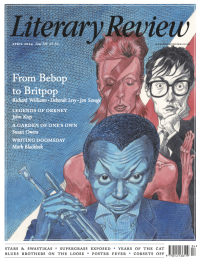Adrian Tinniswood
Just My Type
The Book-Makers: A History of the Book in 18 Remarkable Lives
By Adam Smyth
The Bodley Head 400pp £25
Books do furnish a room. Folios and quartos and octavos lie in prominent positions on coffee tables or sprawl in untidy piles on the floor. They fill entire walls. Perhaps some are still in pristine dust jackets or those shiny plastic sleeves so beloved of bibliophiles. Others have faded spines, bumped bindings and scarcely legible lettering.
These repositories of the world’s knowledge are the subject of The Book-Makers. But Adam Smyth isn’t particularly interested in the words of wisdom they contain. The Book-Makers is a passionate paean to the book, in all its different forms, as an object. Starting in 1500 with a marvellous reconstruction of Wynkyn de Worde’s printshop ‘in fleete strete at the sygne of the sone’ and ending with zines and the one-off, definition-defying creations of contemporary artists like Laura Grace Ford and Yusuf Hassan, Smyth explores binders and papermakers, small presses and big lending libraries, taking in Shakespeare’s First Folio and William Morris’s Kelmscott Chaucer along the way. Notwithstanding his respect for the giants of the book world, he constantly reminds us of the ordinary. ‘The history of the book as a discipline has been preoccupied with what we might think of as landmark publications,’ he says. But such books ‘are deeply unrepresentative of the kinds of texts that typically emerged from binders’ offices and printing chapels and that filled the stalls of booksellers and the pockets of readers’. Most publications have been ephemeral works – almanacs, broadsheets and the like.
Smyth is fascinating on the practical side of historical book production: how in the 17th century printed sheets were folded, beaten with a ten-pound hammer to flatten them, sewn together and pressed between pasteboards covered with calfskin; how in the 18th century John Baskerville started out as a writing

@Lit_Review
Follow Literary Review on Twitter
Twitter Feed
Alfred, Lord Tennyson is practically a byword for old-fashioned Victorian grandeur, rarely pictured without a cravat and a serious beard.
Seamus Perry tries to picture him as a younger man.
Seamus Perry - Before the Beard
Seamus Perry: Before the Beard - The Boundless Deep: Young Tennyson, Science, and the Crisis of Belief by Richard Holmes
literaryreview.co.uk
Novelist Muriel Spark had a tongue that could produce both sugar and poison. It’s no surprise, then, that her letters make for a brilliant read.
@claire_harman considers some of the most entertaining.
Claire Harman - Fighting Words
Claire Harman: Fighting Words - The Letters of Muriel Spark, Volume 1: 1944-1963 by Dan Gunn
literaryreview.co.uk
Of all the articles I’ve published in recent years, this is *by far* my favourite.
✍️ On childhood, memory, and the sea - for @Lit_Review :
https://literaryreview.co.uk/flotsam-and-jetsam